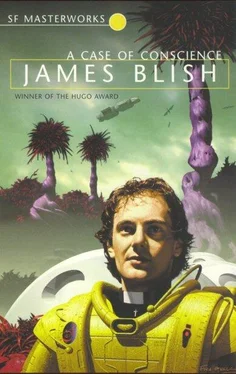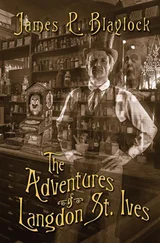(Cleaver was testifying before a packed court convened in the UN General Assembly chambers in New York, with one finger pointed dramatically, but less in triumph than in sorrow, at Ramon Ruiz-Sanchez, S. J. At the sound of his name the dream collapsed, and he realized that the room had grown a little lighter. Dawn-or the dripping, wool-gray travesty of it which prevailed on Lithia-was on its way. He wondered what he had just said to the court. It had been conclusive, damning, good enough to be used when he awoke; but he could not remember a word of it. All that remained of it was a sensation, almost the taste of the words, but nothing of their substance.)
AGRONSKI: It’s getting light. I suppose we’d better knock off.
MICHELIS: Did you stake down the ’copter? The winds down here are higher than they are up north, I seem to remember.
AGRONSKI: Yes. And covered it with the tarp. Nothing left to do now but sling our hammocks-
(A sound)
MICHELIS: Shhh. What’s that?
AGRONSKI: Eh?
MICHELIS: Listen.
(Footsteps. Faint ones, but Cleaver knew them. He forced his eyes to open a little, but there was nothing to see but the ceiling. Its even color, and its smooth, ever-changing slope into a dome of nowhereness, drew him almost immediately upward into the mists of trance once more.)
AGRONSKI: Somebody’s coming.
(Footsteps.)
AGRONSKI: It’s the Father, Mike-look out here and you can see him. He seems to be all right. Dragging his feet a bit, but who wouldn’t after being out helling all night?
MICHELIS: Maybe you’d better meet him at the door. It’d probably be better than our springing out at him after he gets inside. After all he doesn’t expect us. I’ll get to unpacking the hammocks.
AGRONSKI: Sure thing, Mike.
(Footsteps, going away from Cleaver. A grating sound of stone on stone: the door wheel being turned.)
AGRONSKI: Welcome home, Father! We just got in a little while ago and-My God, what’s wrong? Are you ill too? Is there something that-Mike! Mike!
(Somebody was running. Cleaver willed his neck muscles to lift his head, but they refused to obey. Instead, the back of his head seemed to force itself deeper into the stiff pillow of the hammock. After a momentary and endless agony, he cried out)
CLEAVER: Mike!
AGRONSKI: Mike!
(With a gasp, Cleaver lost the long battle at last. He was asleep.)
As the door of Chtexa’s house closed behind him, Ruiz-Sanchez looked about the gently glowing foyer with a feeling of almost unbearable anticipation, although he could hardly have said what it was that he hoped to see. Actually, it looked exactly like his own quarters, which was all he could in justice have expected-all the furniture at “home” Was Lithian, except of course for the lab equipment and a few other terrestrial trappings.
“We have cut up several of the metal meteors from our museums, and hammered them as you suggested,” Chtexa was saying behind him, while he struggled out of his raincoat and boots. “They show very definite, very strong magnetism, as you predicted. We now have the whole of our world alerted to pick up these nickel-iron meteorites and send them to our electrical laboratory here, regardless of where they are found. The staff of the observatory is attempting to predict possible falls. Unhappily, meteors are rare here. Our astronomers say that we have never had a’shower’ such as you describe as frequent on your native planet.”
“No; I should have thought of that,” Ruiz-Sanchez said, following the Lithian into the front room. This, too, was quite ordinary by Lithian standards, and empty except for the two of them.
“Ah, that is interesting. Why?”
“Because in our system we have a sort of giant grinding-wheel-a whole ring of little planets, many thousands of them, distributed around an orbit where we had expected to find only one normal-sized world.”
“Expected? By the harmonic rule?” Chtexa said, sitting down and pointing out another hassock to his guest. “We have often wondered whether that relationship was real.”
“So have we. It broke down in this instance. Collisions between all those small bodies are incessant, and our plague of meteors is the result.”
“It is hard to understand how so unstable an arrangement could have come about,” Chtexa said. “Have you any explanation?”
“Not a good one,” Ruiz-Sanchez said. “Some of us think that there really was a respectable planet in that orbit ages ago, which exploded somehow. A similar accident happened to a satellite in our system, creating a great flat ring of debris around its primary. Others think that at the formation of our solar system the raw materials of what might have been a planet just never succeeded in coalescing. Both ideas have many flaws, but each satisfies certain objections to the other, so perhaps there is some truth in both.”
Chtexa’s eyes filmed with the mildly disquieting “inner blink” characteristic of Lithians at their most thoughtful.
“There would seem to be no way to test either answer,” he said at length.
“By our logic, the lack of such tests makes the original question meaningless.”
“That rule of logic has many adherents on Earth. My colleague Dr. Cleaver would certainly agree with it.”
Ruiz-Sanchez smiled suddenly. He had labored long and hard to master the Lithian language, and to have recognized and understood so completely abstract a point as the one just made by Chtexa was a bigger victory than any quantitative gains in vocabulary alone could have been.
“But I can see that you are going to have difficulties in collecting these meteorites,” he said. “Have you offered incentives?”
“Oh, certainly. Everyone understands the importance of the program. We are all eager to advance it.”
This was not quite what the priest had meant by his question. He searched his memory for some Lithian equivalent for “reward,” but found nothing but the word he had already used, “incentive.” He realized that he knew no Lithian word for “greed,” either. Evidently offering Lithians a hundred dollars for every meteorite they found would simply baffle them. He had to abandon that fact.
“Since the potential meteor fall is so small,” he said instead, “you’re not likely to get anything like the supply of metal that you need for a real study-no matter how thoroughly you co-operate on the search. A high percentage of the finds will be stony rather than metallic, too. What you need is another, supplementary iron-finding program.”
“We know that,” Chtexa said ruefully. “But we have been able to think of none.”
“If only you had some way of concentrating the traces of the metal you actually have on the planet now… Our smelting methods would be useless to you, since you have no ore beds. Hmm… Chtexa, what about the iron-fixing bacteria?”
“Are there such?” Chtexa said, cocking his head dubiously.
“I don’t know. Ask your bacteriologists. If you have any bacteria here that belong to the genus we call Leptothrix, one of them should be an iron-fixing species. In all the millions of years that this planet has had life on it, that mutation must have occurred, and probably very early.”
“But why have we never seen it before? We have done perhaps more research in bacteriology than we have in any other field.”
“Because,” Ruiz-Sanchez said earnestly, “you don’t know what to look for, and because such a species would be as rare on Lithia as iron itself. On Earth, because we have iron in abundance, our Leptothrix ochracea has found plenty of opportunity to grow. We find their fossil sheaths by uncountable billions in our great ore beds. It used to be thought, as a matter of fact, that the bacteria produced the ore beds, but I’ve always doubted that. They get their energy by oxidizing ferrous iron into ferric-but that’s a change that can happen spontaneously if the oxidation-reduction potential and the pH of the solution are right, and both of those conditions can be affected by ordinary decay bacteria. On our planet the bacteria grew in the ore beds because the iron was there, not the other way around-but on Lithia the process will have to be worked in reverse.”
Читать дальше











